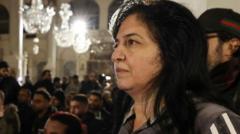The outrage has sparked thousands of demonstrators to take to the streets nationwide, voicing their concerns about the need for the new Islamist governance to protect religious minorities. In Damascus's Bab Touma neighborhood, protesters expressed their defiance by carrying crosses and Syrian flags while chanting, "we will sacrifice our souls for our cross." One protester, identified as Georges, lamented the shrinking space for practicing the Christian faith in Syria, stating, "If we're not allowed to live our Christian faith in our country, as we used to, then we don't belong here anymore."
Syria hosts a mosaic of ethnic and religious communities, including Kurds, Armenians, Assyrians, Christians, Druze, and various Muslim sects, all coexisting with a majority of Arab Sunnis. Just over two weeks ago, rebels succeeded in dethroning Assad's rule that lasted more than five decades. As the future leadership under the Hayat Tahrir al-Sham (HTS) group comes into question, their commitment to governance has been under scrutiny. Despite HTS's ties to a jihadist background, their leaders are advocating for a vision of Syria that respects the rights of all citizens.
While HTS continues to face designation as a terrorist group by numerous international bodies, diplomatic engagements may alter the landscape. On Friday, the US retracted a previously offered $10 million bounty on HTS leader Ahmed al-Sharaa in light of recent dialogues. The ongoing US military operations in Syria continue to target ISIS operatives, illustrating the complexities at play.
The increased presence of foreign fighters and Islamic extremism poses significant threats to the fragile stability in the country, which now seeks to redefine its future amidst the aspirations for security among its diverse minorities.
Syria hosts a mosaic of ethnic and religious communities, including Kurds, Armenians, Assyrians, Christians, Druze, and various Muslim sects, all coexisting with a majority of Arab Sunnis. Just over two weeks ago, rebels succeeded in dethroning Assad's rule that lasted more than five decades. As the future leadership under the Hayat Tahrir al-Sham (HTS) group comes into question, their commitment to governance has been under scrutiny. Despite HTS's ties to a jihadist background, their leaders are advocating for a vision of Syria that respects the rights of all citizens.
While HTS continues to face designation as a terrorist group by numerous international bodies, diplomatic engagements may alter the landscape. On Friday, the US retracted a previously offered $10 million bounty on HTS leader Ahmed al-Sharaa in light of recent dialogues. The ongoing US military operations in Syria continue to target ISIS operatives, illustrating the complexities at play.
The increased presence of foreign fighters and Islamic extremism poses significant threats to the fragile stability in the country, which now seeks to redefine its future amidst the aspirations for security among its diverse minorities.




















